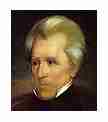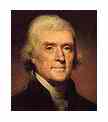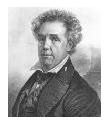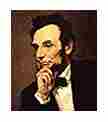Biographies - J through L
 JACKSON,
Andrew, a Representative and a Senator from Tennessee and 7th President of the United States; born on March 15, 1767; in the Waxhaw Settlement in South Carolina; attended an old-field school; though just a boy, participated in the battle of Hanging Rock during the Revolution, was captured by the British and imprisoned; worked for a time in a saddler's shop and afterward taught school; studied law in Salisbury, N.C.; was admitted to the bar in 1787; moved to Jonesboro (now Tennessee) in 1788 and commenced practice; appointed solicitor of the western district of North Carolina, comprising what is now the State of Tennessee, in 1788; held the same position in the territorial government of Tennessee after 1791; delegate to the convention to frame a constitution for the new State 1796; upon the admission of Tennessee as a State into the Union was elected to the Fourth and Fifth Congresses and served from December 5, 1796, until his resignation in September 1797; elected as a Republican in September 1797 to the United States Senate for the term that had commenced March 4, 1797, and served from September 26, 1797, until his resignation in April 1798; judge of the State supreme court of Tennessee 1798-1804; engaged in planting and in mercantile pursuits; served in the Creek War of 1813 as commander of Tennessee forces; his victory in the Creek War brought him a commission as major general in the United States Army in May 1814; led his army to victory over the British in the Battle of New Orleans in January 1815; received the thanks of Congress and a gold medal by resolution of February 27, 1815; commanded an expedition which captured Florida in 1817; served as Governor of the new territory in 1821; again elected to the United States Senate and served from March 4, 1823, to October 14, 1825, when he resigned; chairman, Committee on Military Affairs Eighteenth Congress); unsuccessful candidate for President in 1824; elected as a Democrat President of the United States in 1828; reelected in 1832 and served from March 4, 1829, to March 3, 1837; retired to his country home, the 'Hermitage,' near Nashville, Tenn., where he died June 8, 1845; interment in the garden on his estate.
JACKSON,
Andrew, a Representative and a Senator from Tennessee and 7th President of the United States; born on March 15, 1767; in the Waxhaw Settlement in South Carolina; attended an old-field school; though just a boy, participated in the battle of Hanging Rock during the Revolution, was captured by the British and imprisoned; worked for a time in a saddler's shop and afterward taught school; studied law in Salisbury, N.C.; was admitted to the bar in 1787; moved to Jonesboro (now Tennessee) in 1788 and commenced practice; appointed solicitor of the western district of North Carolina, comprising what is now the State of Tennessee, in 1788; held the same position in the territorial government of Tennessee after 1791; delegate to the convention to frame a constitution for the new State 1796; upon the admission of Tennessee as a State into the Union was elected to the Fourth and Fifth Congresses and served from December 5, 1796, until his resignation in September 1797; elected as a Republican in September 1797 to the United States Senate for the term that had commenced March 4, 1797, and served from September 26, 1797, until his resignation in April 1798; judge of the State supreme court of Tennessee 1798-1804; engaged in planting and in mercantile pursuits; served in the Creek War of 1813 as commander of Tennessee forces; his victory in the Creek War brought him a commission as major general in the United States Army in May 1814; led his army to victory over the British in the Battle of New Orleans in January 1815; received the thanks of Congress and a gold medal by resolution of February 27, 1815; commanded an expedition which captured Florida in 1817; served as Governor of the new territory in 1821; again elected to the United States Senate and served from March 4, 1823, to October 14, 1825, when he resigned; chairman, Committee on Military Affairs Eighteenth Congress); unsuccessful candidate for President in 1824; elected as a Democrat President of the United States in 1828; reelected in 1832 and served from March 4, 1829, to March 3, 1837; retired to his country home, the 'Hermitage,' near Nashville, Tenn., where he died June 8, 1845; interment in the garden on his estate.
![]()
 JEFFERSON, Thomas, a Delegate from Virginia and a Vice President and 3d President of the United States; born at 'Shadwell,' Va., in present-day Albemarle County, Va., on April 13 (Gregorian calendar), 1743; attended a preparatory school; graduated from William and Mary College, Williamsburg, Va., in 1762; studied law; was admitted to the bar and commenced practice in 1767; member, colonial House of Burgesses 1769-1775; prominent in pre-Revolutionary movements; Member of the Continental Congress in 1775 and 1776; chairman of the committee that drew up the Declaration of Independence in the summer of 1776 and made the first draft; signer of the Declaration of Independence; resigned soon after and returned to his estate, 'Monticello'; Governor of Virginia 1779-1781; member, State house of delegates 1782; again a Member of the Continental Congress 1783-1784; appointed a Minister Plenipotentiary to France in 1784, and then sole Minister to the King of France in 1785, for three years; Secretary of State of the United States in the Cabinet of President George Washington 1789-1793; elected Vice President of the United States and served under President John Adams 1797-1801; elected President of the United States in 1801 by the House of Representatives on the thirty-sixth ballot; reelected in 1805 and served from March 4, 1801, to March 3, 1809; retired to his estate, 'Monticello,' in Virginia; active in founding the University of Virginia at Charlottesville; died at 'Monticello,' Albemarle County, Va., July 4, 1826; interment in the grounds of 'Monticello.'
JEFFERSON, Thomas, a Delegate from Virginia and a Vice President and 3d President of the United States; born at 'Shadwell,' Va., in present-day Albemarle County, Va., on April 13 (Gregorian calendar), 1743; attended a preparatory school; graduated from William and Mary College, Williamsburg, Va., in 1762; studied law; was admitted to the bar and commenced practice in 1767; member, colonial House of Burgesses 1769-1775; prominent in pre-Revolutionary movements; Member of the Continental Congress in 1775 and 1776; chairman of the committee that drew up the Declaration of Independence in the summer of 1776 and made the first draft; signer of the Declaration of Independence; resigned soon after and returned to his estate, 'Monticello'; Governor of Virginia 1779-1781; member, State house of delegates 1782; again a Member of the Continental Congress 1783-1784; appointed a Minister Plenipotentiary to France in 1784, and then sole Minister to the King of France in 1785, for three years; Secretary of State of the United States in the Cabinet of President George Washington 1789-1793; elected Vice President of the United States and served under President John Adams 1797-1801; elected President of the United States in 1801 by the House of Representatives on the thirty-sixth ballot; reelected in 1805 and served from March 4, 1801, to March 3, 1809; retired to his estate, 'Monticello,' in Virginia; active in founding the University of Virginia at Charlottesville; died at 'Monticello,' Albemarle County, Va., July 4, 1826; interment in the grounds of 'Monticello.'
![]()
JOHNSON, Francis, a Representative from Kentucky; born in Caroline County, Va., June 19, 1776; pursued preparatory studies; studied law; was admitted to the bar and practiced; moved to Woodford County, Ky., in 1796 and to Bowling Green in 1807; member of the State house of representatives in 1812, 1813, and 1815; elected to the Sixteenth Congress to fill the vacancy caused by the death of David Walker; reelected to the Seventeenth, Eighteenth, and Nineteenth Congresses and served from November 13, 1820, to March 3, 1827; chairman, Committee on the Post Office and Post Roads (Seventeenth and Eighteenth Congresses); moved to Louisville, Ky., in 1829 and resumed the practice of law; served as Commonwealth attorney for the fifth district; unsuccessful Republican candidate for Governor; died in Louisville, Ky., May 16, 1842; interment in the old family burial ground, later a municipal playground.
![]()
 JOHNSON, Richard Mentor, a Representative and a Senator from Kentucky and a Vice President of the United States; born at 'Beargrass,' Jefferson County, Ky., near the present site of Louisville, October 17, 1780; attended the common schools and Transylvania University, Lexington, Ky.; studied law; was admitted to the bar in 1802 and commenced practice in Great Crossings, Ky.; member, State house of representatives 1804-1806 and again in 1819; elected as a Republican to the Tenth and to the five succeeding Congresses (March 4, 1807-March 3, 1819); chairman, Committee on Claims (Eleventh Congress), Committee on Expenditures in the Department of War (Fifteenth Congress); commissioned colonel of Kentucky Volunteers and commanded a regiment in engagements against the British in lower Canada in 1813; elected to the United States Senate to fill the vacancy caused by the resignation of John J. Crittenden; reelected and served from December 10, 1819, to March 3, 1829; unsuccessful candidate for reelection in 1829; chairman, Committee on Post Office and Post Roads (Nineteenth and Twentieth Congresses); elected to the Twenty-first and to the three succeeding Congresses (March 4, 1829-March 3, 1837); chairman, Committee on Post Office and Post Roads (Twenty-first and Twenty-second Congresses), Committee on Military Affairs (Twenty-second through Twenty-fourth Congresses); was chosen Vice President of the United States by the Senate on February 8, 1837, no candidate having received a majority of the electoral vote, and served under President Martin Van Buren from March 4, 1837, to March 3, 1841; member, State house of representatives 1850; died in Frankfort, Ky., November 19, 1850; interment in the Frankfort Cemetery.
[See Table
of Partiicipants]
JOHNSON, Richard Mentor, a Representative and a Senator from Kentucky and a Vice President of the United States; born at 'Beargrass,' Jefferson County, Ky., near the present site of Louisville, October 17, 1780; attended the common schools and Transylvania University, Lexington, Ky.; studied law; was admitted to the bar in 1802 and commenced practice in Great Crossings, Ky.; member, State house of representatives 1804-1806 and again in 1819; elected as a Republican to the Tenth and to the five succeeding Congresses (March 4, 1807-March 3, 1819); chairman, Committee on Claims (Eleventh Congress), Committee on Expenditures in the Department of War (Fifteenth Congress); commissioned colonel of Kentucky Volunteers and commanded a regiment in engagements against the British in lower Canada in 1813; elected to the United States Senate to fill the vacancy caused by the resignation of John J. Crittenden; reelected and served from December 10, 1819, to March 3, 1829; unsuccessful candidate for reelection in 1829; chairman, Committee on Post Office and Post Roads (Nineteenth and Twentieth Congresses); elected to the Twenty-first and to the three succeeding Congresses (March 4, 1829-March 3, 1837); chairman, Committee on Post Office and Post Roads (Twenty-first and Twenty-second Congresses), Committee on Military Affairs (Twenty-second through Twenty-fourth Congresses); was chosen Vice President of the United States by the Senate on February 8, 1837, no candidate having received a majority of the electoral vote, and served under President Martin Van Buren from March 4, 1837, to March 3, 1841; member, State house of representatives 1850; died in Frankfort, Ky., November 19, 1850; interment in the Frankfort Cemetery.
[See Table
of Partiicipants]
![]()
LEIB, Michael, a Representative and a Senator from Pennsylvania; born in Philadelphia, Pa., January 8, 1760; attended the common schools; studied medicine and commenced practice in Philadelphia, Pa.; commissioned surgeon in the Philadelphia Militia in 1780, and served throughout the Revolutionary War; resumed the practice of medicine and served on the staff of several Philadelphia hospitals; member of the committee of correspondence in 1793; member of the State house of representatives 1795-1798; elected to the Sixth and to the three succeeding Congresses and served from March 4, 1799, until February 14, 1806, when he resigned; member, State house of representatives 1806-1808; brigadier general of the Philadelphia Militia 1807-1811; member of the committee of correspondence on the Chesapeake affair, June 1807; elected as a Republican to the United States Senate in 1808 for the term beginning March 4, 1809; subsequently elected to fill the vacancy in the term ending March 3, 1809, caused by the resignation of Samuel Maclay and served from January 9, 1809, to February 14, 1814, when he resigned, having been appointed postmaster of Philadelphia; served as postmaster until 1815; member, the State house of representatives 1817-1818, and the State senate 1818-1821; appointed as a prothonotary of the United States district court at Philadelphia and served from November 1822, until his death in Philadelphia, Pa., on December 8, 1822; interment in St. John's Lutheran Churchyard, Northern Liberties, Philadelphia, Pa.
![]()
LEIGH, Benjamin Watkins, a Senator from Virginia; born in Chesterfield County, Va., on June 18, 1781; studied under private tutors; graduated from William and Mary College, Williamsburg, Va., in 1802; studied law; was admitted to the bar and commenced practice in Petersburg, Va.; served in the War of 1812; member, State house of delegates 1811-1813; where in 1811 he presented resolutions asserting the right of the legislature to instruct United States senators elected by it; moved to Richmond, Va., in 1813; prepared the Virginia Revised Code of 1819; delegate to the State constitutional convention of 1829 and 1830; member, State house of delegates 1830-1831; official reporter of the State court of appeals 1829-1841; elected as a Whig to the United States Senate to fill the vacancy in the term ending March 3, 1835, caused by the resignation of William C. Rives; reelected in 1835 and served from February 26, 1834, to July 4, 1836, when he resigned; resuming the practice of law. He was the compiler of "Reports of the Court of Appeals and General Court", 1829-1841. The degree of Doctor of Laws by the College of William and Mary, 1837. He died in Richmond, Va., February 2, 1849; interment in Shockoe Cemetery.
![]()
 LINCOLN, Abraham, a Representative from Illinois and 16th President of the United States; born in Hardin County, Ky., February 12, 1809; moved with his parents to a tract on Little Pigeon Creek, Ind., in 1816; attended a log-cabin school at short intervals and was self-instructed in elementary branches; moved with his father to Macon County, Ill., in 1830 and later to Coles County, Ill.; read the principles of law and works on surveying; during the Black Hawk War he volunteered in a company of Sangamon County Rifles organized April 21, 1832; was elected its captain and served until May 27 following, when the company was mustered out of service; reenlisted as a private and served until mustered out June 16, 1832; returned to New Salem, Ill., and was unsuccessful as a candidate for the State house of representatives; entered business as a general merchant in New Salem; postmaster of New Salem 1833-1836; deputy county surveyor 1834-1836; elected a member of the State house of representatives in 1834, 1836, 1838, and 1840; declined to be a candidate for renomination; was admitted to the bar in 1836; moved to Springfield, Ill., in 1837 and engaged in the practice of law; elected as a Whig to the Thirtieth Congress (March 4, 1847-March 3, 1849); did not seek a renomination in 1848; an unsuccessful applicant for Commissioner of the General Land Office under President Taylor; tendered the Governorship of Oregon Territory, but declined; unsuccessful Whig candidate for election to the United States Senate before the legislature of 1855; unsuccessful Republican candidate for the United States Senate in 1858; elected as a Republican President of the United States in 1860; reelected in 1864 and served from March 4, 1861, until his death; assassinated in Washington, D.C., April 14, 1865, and died the following day; interment in Oak Ridge Cemetery, Springfield, Ill.
LINCOLN, Abraham, a Representative from Illinois and 16th President of the United States; born in Hardin County, Ky., February 12, 1809; moved with his parents to a tract on Little Pigeon Creek, Ind., in 1816; attended a log-cabin school at short intervals and was self-instructed in elementary branches; moved with his father to Macon County, Ill., in 1830 and later to Coles County, Ill.; read the principles of law and works on surveying; during the Black Hawk War he volunteered in a company of Sangamon County Rifles organized April 21, 1832; was elected its captain and served until May 27 following, when the company was mustered out of service; reenlisted as a private and served until mustered out June 16, 1832; returned to New Salem, Ill., and was unsuccessful as a candidate for the State house of representatives; entered business as a general merchant in New Salem; postmaster of New Salem 1833-1836; deputy county surveyor 1834-1836; elected a member of the State house of representatives in 1834, 1836, 1838, and 1840; declined to be a candidate for renomination; was admitted to the bar in 1836; moved to Springfield, Ill., in 1837 and engaged in the practice of law; elected as a Whig to the Thirtieth Congress (March 4, 1847-March 3, 1849); did not seek a renomination in 1848; an unsuccessful applicant for Commissioner of the General Land Office under President Taylor; tendered the Governorship of Oregon Territory, but declined; unsuccessful Whig candidate for election to the United States Senate before the legislature of 1855; unsuccessful Republican candidate for the United States Senate in 1858; elected as a Republican President of the United States in 1860; reelected in 1864 and served from March 4, 1861, until his death; assassinated in Washington, D.C., April 14, 1865, and died the following day; interment in Oak Ridge Cemetery, Springfield, Ill.
|
This Internet Presentation is Copyright 13th-amendment.org
Documents presented on this site are the property of their respective authors as
credited.
Please contact them for reprint permissions. contact
[Project 13 Email] |